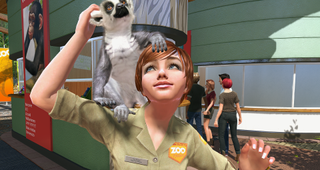12DOVE Verdict
Pros
- +
Satisfying time management exercises
- +
Convincing animal models
- +
Extensive customization options
- +
Learning all about animals and conservation
Cons
- -
Tedious menu navigation
- -
Limited number of unique species
Why you can trust 12DOVE
Zoos provide a convenient location where wimps like me can come face-to-face with ferocious animals that, in the wild, would surely eat us. Zoo Tycoon on Xbox One aims to delight and inform animal lovers by capturing the thrill of such interactions in digital form. It’s no replacement for the real thing, but it’s definitely worth a look if you can tolerate a few nagging flaws.
Whether you play in the Campaign, Freeform, or Challenge mode, the goal in Zoo Tycoon is always the same: build the best facility you can with whatever you are given. The structured campaign lays out specific goals and limitations, and it teaches you about any good zoo’s secondary purpose: conservation. You’re also rewarded with goodies you can use in the other modes. If you want a proper “game,” the main course should keep you busy for a couple dozen hours or more, depending on your skill with menus and virtual economies. Challenge mode instead offers a few rotating tasks that get old pretty quickly, while Freeform lets you take it easy.

Relaxation is the enemy in the campaign and challenge modes, and so is anything else that wastes time or money because there’s no option to stop or slow the timer while you make adjustments. Attention to detail and your ability to multi-task will take you far. It’s not enough to set ticket prices and forget about them, for instance. Customers will only frequent your zoo if they like your reputation, which is married to your marketing, size, and exhibit variety. Patrons also demand ancillary amenities, like gift shops and concessions, and each attraction must be kept operational without becoming a distraction. You can customize almost anything, from the look of benches and walkways to the price of food or access to restrooms, but only when there’s not something more important to do--so, basically never.
Keeping finances straight while coping with time constraints is rough, and sometimes feels just plain cheap. Before you can do almost anything, you have to pump time and resources into research. You only get to have one such project going at once, so you can’t afford to waste two minutes on a task that doesn’t contribute directly to your long-term plan. Sometimes it feels like you haven’t a second to spare, even if a scenario begins with a generous 50-minute timer. Young gamers might not be up to it, and they may also be turned off by all of the reading, even if the core mechanics otherwise seem perfectly suited for gamers of all ages. That said, the feeling of satisfaction when everything comes together and a thriving zoo emerges from the chaos is a terrific reward, a perfectly fuzzy payoff.

When everything goes well and you aren’t stressing over the timer and finances (even if perhaps you should be and just don’t realize it yet), there’s a lot to love about Zoo Tycoon. It’s possible to sweep over the landscape you shaped from high overhead, panning and zooming in and out. Pressing the appropriate button seamlessly drops you to ground level, where you can zip through the crowds in a cart, or walk slowly and gawk at wildlife as animals wander around their enclosures, bathe, eat, or just play. Pedestrians start feeling fake the minute you pay much attention to them, but the fuzzy main attractions are thoroughly convincing, with proper attention paid to nearly every whisker. You can even build points of interaction with animals, which lets you get up close and personal as you hand fruit or vegetables to a hungry giraffe or make faces through glass at a chimpanzee or tiger.
Sadly, the number of unique animals you see the most of is lacking. There’s a high headcount, but also a few questionable omissions (otters, penguins, kangaroos, and, perhaps most egregious of all, pandas), and the only wild cats in sight are tigers and lions. Smaller enclosures feature a variety of other interesting options like parrots and snakes, but it’s hard not to wish for more.

The game’s bigger issue, however, is poorly planned navigation. It’s difficult to even figure out how to get a game going with friends—who can play online in your zoo if you invite them from the correct screen—and far too much of the core experience amounts to menu diving while you ignore the pretty visuals. You’ll have to access the top level of a menu tree to bring up options for a given exhibit, for example. Then you must indicate whether you want to deal with animals or with the structure itself.
Suppose you want the latter. You next are asked to specify a station for general care, an enhancement for the animal’s amusement, or an interaction point for visitors. Incredibly, menus sometimes go a couple of layers deeper than that, making for a convoluted experience. Most choices feel like they could have been merged into only one or two screens and the game would have been better for it. Over the course of however many dozens of hours you spend with the game, the chores you must perform definitely live up to their name and that’s a real shame.

Capturing the feeling of actually being at a zoo is nigh on impossible in video game form. The smell alone... oh man. But Zoo Tycoon does an admirable job at least orienting its players with the logistics of running one, dropping in some well-researched facts about the animals to boot. Though the interface will pressure you and you'll find yourself wondering where all the panda bears have gone, there are many enjoyable hours to be had here.

More info
| Genre | Simulation |
| Description | Build and manage your own zoo in this installment to the tycoon franchise. |
| Platform | "Xbox One","PC" |
| US censor rating | "Everyone","Everyone" |
| UK censor rating | "","" |
| Release date | 1 January 1970 (US), 1 January 1970 (UK) |

A new Batman #1 from Matt Fraction and Jorge Jiménez launches this September with a "revamped aesthetic," a throwback costume, and a new Batmobile

Marvel reveals its full slate of May 2025 comics and covers featuring the Avengers, the X-Men, Spider-Man, and more

Former Witcher 3 lead says his new vampire RPG Blood of Dawnwalker has a smaller open world because "it feels more like you actually know the place" compared to "behemoths"
Most Popular




